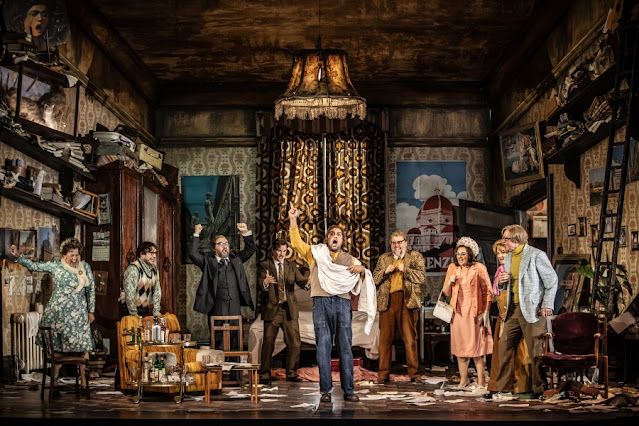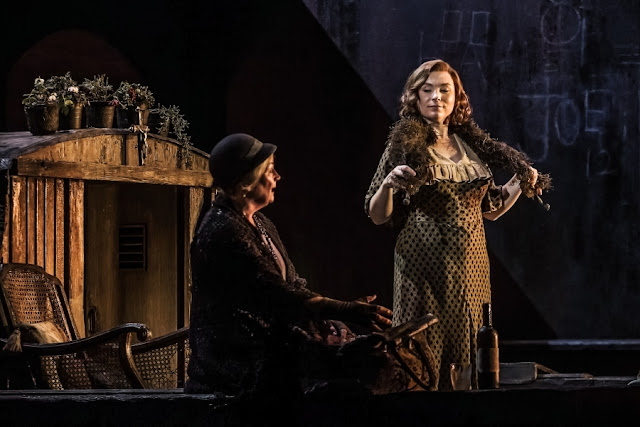 |
| Puccini: Il tabarro – Yvonne Howard, Natalya Romaniw – Welsh National Opera (Photo: Craig Fuller) |
Puccini: Il trittico, Dario Solari, Natalya Romaniw, Andrés Presno, Anne Mason, Haegee Lee, Trystan Llŷr Griffiths, director David McVicar/Greg Eldridge, conductor Alexander Joel; Welsh National Opera at Wales Millennium Centre
Reviewed 29 September 2024
Partially re-cast, WNO’s latest revival of David McVicar’s fine production reveals a strong ensemble of singing actors with compelling performances including Natalya Romaniw on top form
David McVicar‘s production of Puccini’s Il Trittico debuted at Scottish Opera last year and was revived by Welsh National Opera (WNO) earlier this year, associate director Greg Eldridge. The production returned to Wales Millennium Centre on Sunday 29 Septemer, conducted by Alexander Joel with significant cast changes from WNO’s earlier outing. Newcomers included Natalya Romaniw as Giorgetta and Suor Angelica, Dario Solari as Michele and Gianni Schicchi, Andrés Presno as Luigi, Anne Mason as the Princess and Zita, with Haegee Lee as Sister Genovietta and Lauretta and Trystan Llŷr Griffiths as Rinuccio.
The production remains a remarkable achievement, particularly given the problems besetting the company with leaflets being distributed outside the Millennium Centre by Equity in support of the WNO orchestra and chorus, and the chorus taking their final bow (after Suor Angelica) in support WNO t-shirts.
McVicar and designers Charles Edwards and Hannah Clark set the operas in the mid-20th century, creating similar solutions to the opera’s challenges as Richard Jones did in his 2011 production for Covent Garden [see my review of the 2016 revival]
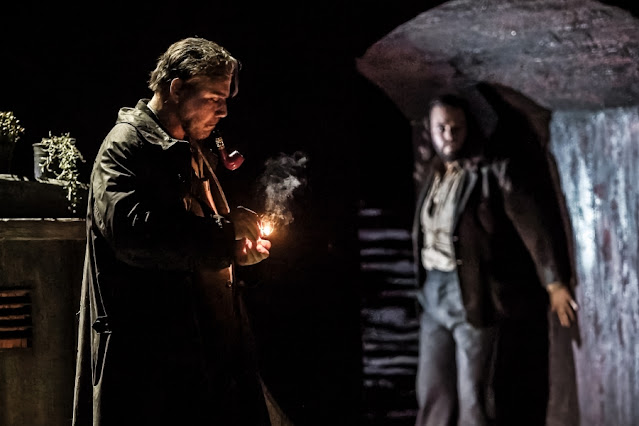 |
| Puccini: Il tabarro – Dario Solare, Andrés Presno – Welsh National Opera (Photo: Craig Fuller) |
Edwards’ set for Il Tabarro was a fascinating mix of realism and stylisation, a barge coming in to moor but the surrounding warehouse and bridge was less detailed. Dark in colour, the setting provided a brooding backdrop for the quotidian, dreary work for the barge men, Luigi (Andrés Presno), Tinca (Mark Le Brocq) and Talpa (Wojtek Gierlach), and it was their daily drudgery that formed the backdrop for the drama.
As Alexander Joel points out in his article in the programme book, this is something that Il Tabarro and Suor Angelica have in common, Puccini sets up the routine of daily life with its little intensities, as an offset for the drama. This meant that in Il tabarro, individual episodes stood out, the dancing had a manic intensity to it, the hymn to Belleville was a rare moment of uninhibited passion, whilst Yvonne Howard’s wonderfully warm La Frugola was a lovely moment of naturalism, and her and Wojtek Gierlach’s Talpa going off singing about their little cottage provided a sense of warm ordinariness compared to the simmering passions on the barge.
At first, everything was all looks and tiny actions, the suppressed tension between Romaniw’s Giorgetta and Solari’s Michele creating an atmosphere you could cut with a knife, and there was intensity too between Romaniw and Presno in the lovers’ snatched moments. Their stillness together in the heat of the dance episode was notable. The Belleville episode allowed Romaniw to soar, revealing what Giorgetta was supressing. Neither she nor Solari’s brooding Michele were entirely at fault, the sheer pressure of the closed environment helped blow things up. Both Solari and Romaniw were brilliant at showing us these suppressed emotions, and Solari’s biting ‘whore’ after a quite ordinary dialogue with Romaniw was shocking. Presno was vibrant and ardent of voice, giving Luigi as lithe intensity the set off the incipient wildness in Romaniw’s Giorgetta.
These principals were finely supported by Haegee Lee and Trystan Llŷr Griffiths as the young lovers (Lauretta and Rincuccio having an illicit tryst, perhaps), plus Paul Jenkins as the organ grinder and Rohdri Prys Jones as the song seller.
This was not the most vicious of realisations of the story, what came over was the brooding melancholy and suppressed passion worn down by quotidian drudgery.
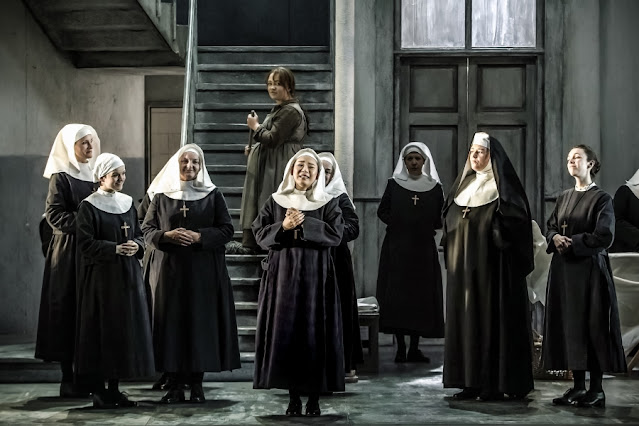 |
| Puccini: Suor Angelica – Welsh National Opera (Photo: Craig Fuller) |
Edwards’ set for Suor Angelica was a hallway, an interstitial transitional place between convent, cloister, chapel and the outside world. A portrait of Pope Pius XIII (reigned 1939-1958) gave a clear indication of time period. Here we watched the lives of the sisters unfold, the small joys such as the shaft of light in the cloister (not actually seen by us) and the penances. They did seem to be a particularly unruly bunch with the production providing a nice differentiation of characters including the Abbess (Sioned Gwen Davies), Sister Genovietta (Haegee Lee), Mistress of Novices (Helen Jarmany), Novice (Alys Meredi Roberts) and the Infirmary Sister (Yvonne Howard). The presence of four young women laundresses, some pregnant and one having her baby forcibly removed at the opening, suggested the Magdalene laundries.
Haegee Lee’s delightful Sister Genovietta reminded me somewhat of Soeur Constance in Poulenc’s Carmelites (Suor Angelica as Blanche? Discuss!). And Natalya Romaniw’s Angelica emerged out of these character portraits. Intense and anxious, this Angelica became inward when faced with Anne Mason’s Princess, but just as tenacious. The beauty of Mason’s Princess was that she was not a complete harridan, simply a woman holding on to what she had and as intensely religious as Angelica, just in a different way. Gradually the focus of Romaniw’s Angelica on her son emerged, drawing real fervour out of her. The ending was one superbly judged crescendo and Romaniw’s performance drew us along. The final scene was by turns searing and moving, true to the libretto and to Puccini, whilst avoiding kitsch. And the performances from young Louis Dreyer as Angelica’s son was notable.
With Gianni Schicchi we left realism behind. Edwards’ set was one big room, elaborated yet dingy and full of stuff (including lots of papers for the relatives to throw around). Hannah Clark had had great fun with the costumes which pointed to the 1960s and the wigs, too, took on characters of their own. The relatives, Zita (Anna Mason), Gherardo (Mark Le Brocq), Nella (Linda Richardson), Betto Di Signa (Benjamin Bevan), Simone (Wojtek Gierlach), Marco (James Cleverton) and La Ciesca (Sioned Gwen Davies), were grotesques, costumes, makeup and acting all over emphasised. The seven had fun creating seven different, vivid caricatures yet functioning as a superb ensemble. This was the quotidian against with Solari’s Gianni Schicchi, Lee’s Lauretta and Griffiths’ Rinuccio functioned. The result was to make Schicchi less of the trickster and more humanly pragmatic. Solari had a nice line in comedy but there was a sense of humanity too along with warmth when dealing with Lee’s delightful Lauretta, with ‘O mio babbino caro’ a lovely moment of stillness. Griffiths’ nerdy Rinuccio was totally engaging with a fine sense of line and his final duet with Lee was captivating.
In the pit Alexander Joel and the orchestra were on terrific form. Joel paced the work superbly, ensuring the drama flowed well, the the feeling of quotidian was there also, never rushed. The result was, I think, masterly and Joel drew a performance of some sophistication from the orchestra.
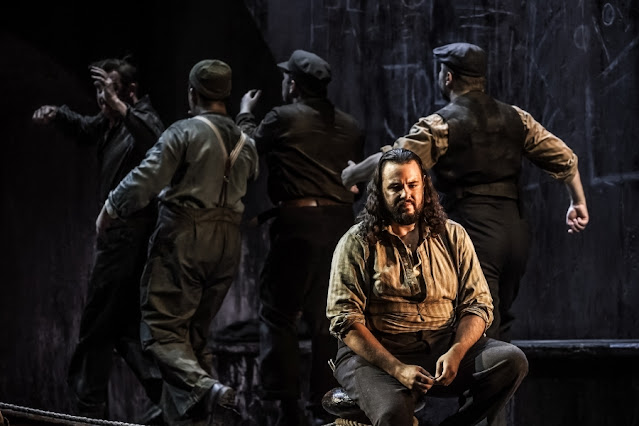 |
| Puccini: Il tabarro – Andrés Presno – Welsh National Opera (Photo: Craig Fuller) |
Puccini’s Il trittico remains a special treat. It is very much an ensemble work, a company work, something that really played to WNO’s strengths. It requires a team of fine singing actors and virtually defies diva-dom as no particular performer can carry the whole. WNO fielded a wonderfully strong and balanced cast, with Natalya Romaniw on searing form on her home turf.
The blog is free, but I’d be delighted if you were to show your appreciation by buying me a coffee.
Elsewhere on this blog
- Embodied sound: Zubin Kanga on his innovative approach to new technology through his interdisciplinary musical programmes – interview
- Compelling performances: Stephen Hough, YL Male Voice Choir, Santtu-Matias Rouvali and the Philharmonia – concert review
- Investing in the magic of Purcell’s music: The Fairy Queen from The Sixteen at Cadogan Hall – opera review
- High-quality music-making & imaginative programming in the special natural setting of Exmoor & Dartmoor: I chat to Tamsin Waley-Cohen of the Two Moors Festival – interview
- A superb sense of community: Mascagni’s Cavalleria Rusticana at Blackheath Halls Opera – opera review
- Remembrance and renewal: Peter Seabourne’s My Song in October – record review
- Both audience & player go on a journey together: Latvian pianist Reinis Zariņš discusses Messiaen’s Vingt Regards which he performs at the London Piano Festival – interview
- Celebrating Jommelli in style: Ian Page & The Mozartists make a compelling case for this neglected music – concert review
- Fire and water in the library: Siren Duo in an imaginative flute and harp recital for Temple Music – concert review
- An interview with the Snow Maiden: I chat to Ffion Edwards about taking on the title role in Rimsky Korsakov’s opera with English Touring Opera – interview
- Home



